#but also the more I focused on it the more parallels I found
Explore tagged Tumblr posts
Text
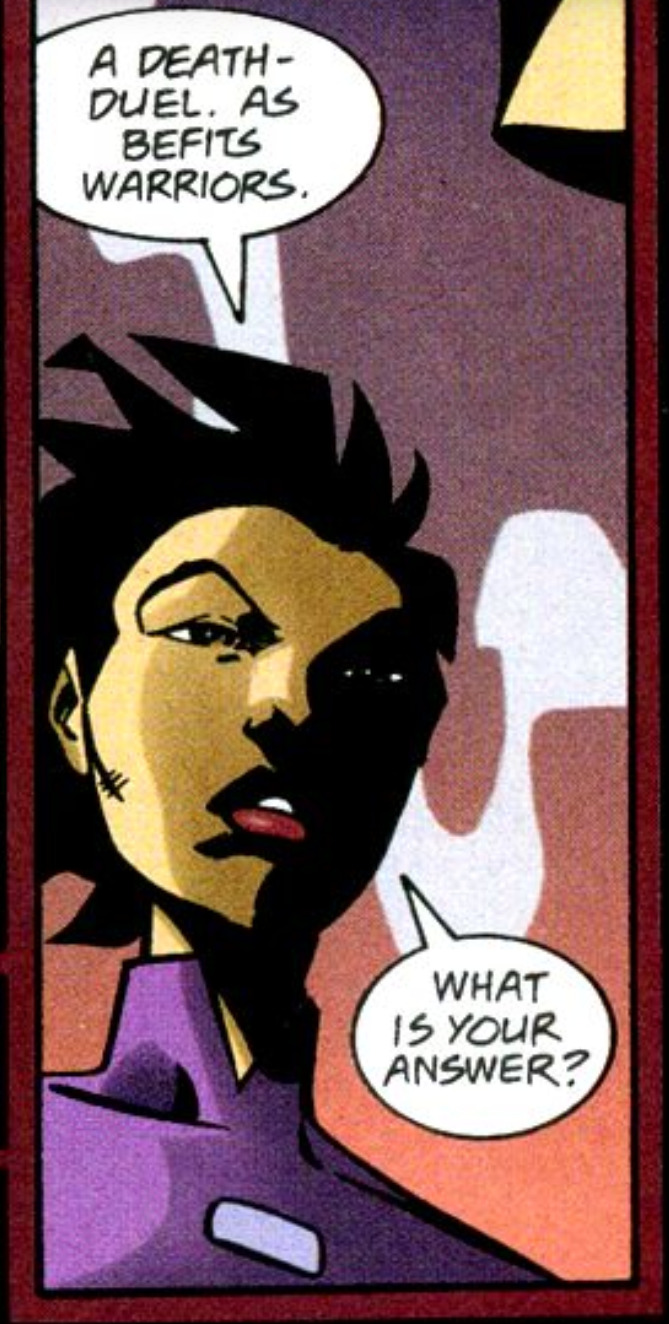
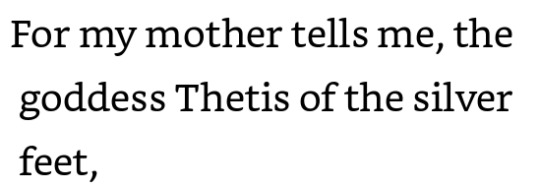


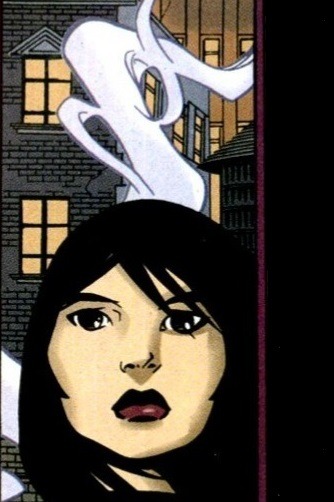
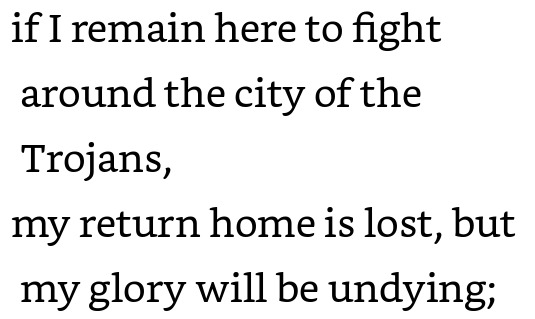


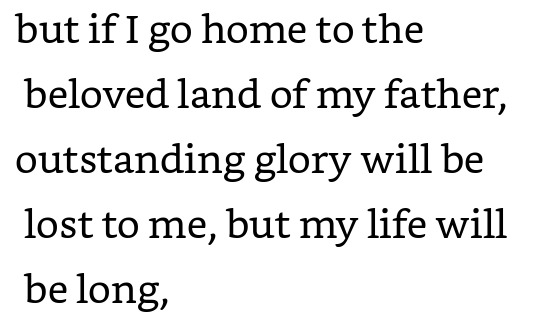
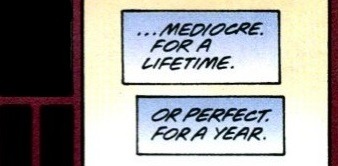



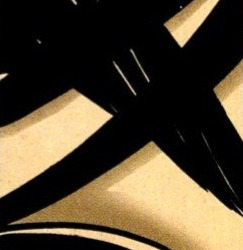
Batgirl #9 (2000) // the Iliad trans. Caroline Alexander // Táin Bó Cuailnge trans. Thomas Kinsella
#cassandra cain#dc#batgirl#batman#web weaving#I've wanted to make this post for years now#when I first read this scene in the comic I almost screamed!! the choice between a short life and glory or a long life and mediocrity. just#AHHHHHHHHH#anyway DC should do more with this Cassandra Cain is SUCH an interesting character with#the way she shares characteristics with classic heroes of myth and legend#I mean all superheroes do to a certain extent#but they're usually not this overt#may never do this again lol I have zero programs for this and it took forever#but also the more I focused on it the more parallels I found#Achilles and his mother#Cass and Lady Shiva#heck even to some extent Cúchulainn and Cathbad#who may or may not be his grandfather#if Cass chooses to get Shiva's help she'll have to come back in a year to fight to the death (and she expects to die)#if Achilles chooses to fight the Trojans he'll die during the war#if Cúchulainn picks up those weapons (choosing to fight for glory) his life will be short#if Cass chooses to do things Bruce's way (choosing her father) she'll can be Batgirl again#but never with the same skill level#if Achilles chooses to return to his father's land he will never achieve fame and glory but he'll live a long life#you can't really see it in these snippets but Cúchulainn's already made the choice and it can't be taken back#but you could parallel it with Conchobar's anger or with Cathbad's prediction of woe coming to that child#they're his mother's family but they are the paternal figures here#and in the end all three choose perfection and glory and fame over a long life of mediocrity#ANYWAY I find it fascinating#dc once again please hire me
81 notes
·
View notes
Text
you know in all the posting about irving and helly’s friendship after last ep, i haven’t seen anyone mention yet that he was one of the two people who first saw her, who watched her (through the screen, on the other side of the wall) as she woke up for the first time, confused and scared and burning with anger. and then he was the one who brought her back; he was the one she first saw (holding her in his arms), as she was confused and scared and freezing. he was there for her start, and she was there again just in time for his end.
#severance#severance season 2#severance spoilers#helly r#irving bailiff#i hesitate to call it a father-daughter thing because imposing familial roles on helly’s relationships feels gross to me#(lumon tried to force them into that found family model and. well. razor to her throat)#but there are interesting parallels to draw there. he’s there for your birth and you outlive him.#helly’s one interaction with ''her'' father was him giving praise and love that was laced with cruelty and never even meant for her#then irving literally almost drowns her and yet she knows (or will very soon) that it’s the purest act of love#fucked up huh#…i also wonder if the reason helena focused on appeasing/bonding with irving over dylan#(who i’d argue helly had more of a developed friendship with in season 1)#is because she sees irving in that way. because having lost her father’s approval she’s seeking it from someone she can slot into that role#posts from the severed floor#data analysis
126 notes
·
View notes
Text
If there's one thing TGWDLM fans are gonna do, it's think about the implications. And the implications of the opening number are crazy.
So. We know that the show isn't completely chronological since the opening number takes place before the meteor hits. So that song is a sort of "flash forward" moment. But when you think about it, we don't really know how far in the future it takes place.
What we do know is that by the time it's happening, Emma is infected. She has a little solo in it singing about how Paul is pining over a barista

And we know that this is meant to be an infected Emma specifically. Lauren had other characters in the show, if they wanted to avoid the Emma implication they would've just dressed her as one of those.
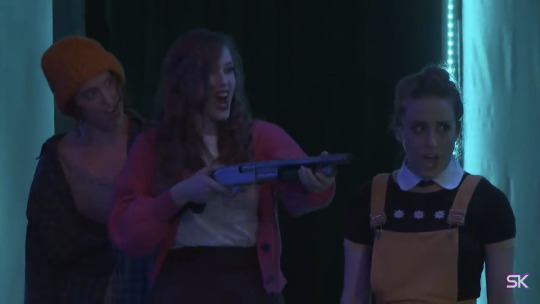
So we know this is meant to be Emma.
And Emma isn't infected until the very end of the show. She's dragged off stage during the credits. So since she's infected in the opening number, we know the number takes place after the events of the show.
Another important detail is that Paul is infected before Emma. He's the one that passes it on to her.
So back to the opening number, Emma is infected. Which means by just following a simple timeline, Paul must also be infected. He should be singing and dancing, right?
But that's not what happens. Paul misses his entrance.

If Paul is infected, then there's no reason he should be missing his entrance. Furthermore, if he's a part of a hive mind, there's no reason other members of the same hive mind shouldn't know where he is. They are literally all connected by one brain, and yet both Mr. Davidson and Bill express they have no clue where he went.
What I'm saying is that Paul is not infected. He was infected (again, we know that because Emma is infected and he was infected before her) but now he's not anymore.
I'm saying there's a way out of the hive, and Paul found it. That's the only explanation that makes sense given the facts of the situation. Sometime after the events of tgwdlm, Paul is able not only to break out the hive mind, but to hide from it.
And if he broke out, others could do the same. Maybe even Emma.
Edit because a countertheory has emerged: Yes it's possible that everyone is infected the entire time and the show itself is just Pokey replaying the events for the fun of it. But it seems unlikely to me. First of all, each of the Lords in Black has a distinct personality. They all are evil, but within that they seems to fall somewhere on a spectrum of "silly billy" to "prick." For example, Tinky is more of a silly billy. He toys with humans without much of a motive and more for just shits and giggles. But in every instance, Pokey's more on the extreme side of prick.
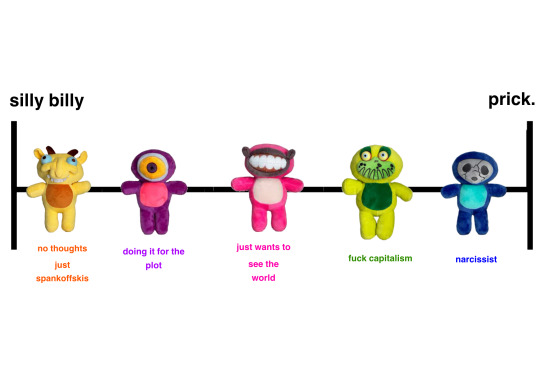
He's one of the few with an actual motive behind what he does. In Yellowjacket, it's confirmed that Pokotho hates the sound of anyone's voice except for his own. The events of TGWDLM don't happen because Pokey is bored, they happen because he is executing a plan. So I don't think that he would just have them play out their little scenario just to entertain him, especially just one small island? I just feel like he'd be more focused on world domination.
If the theory is that all this is happening after Pokey's already taken over the whole world, no one was successful in stopping him, then yes it's plausible, but still weird. There are a strange amount of things in that show you just think an eldritch god wouldn't include.
Edit 2: New evidence has emerged???
The Guy Who Didn't Like Musicals is loosely based off of Invasion of The Body Snatchers. Paul's last name is even a nod to the main character, Matthew. At the end of the film, Matthew survives, and continues living among the infected, pretending to be one of them. And wouldn't that be just such a fun little parallel...
Obviously it doesn't prove anything but the source material doesn't lie folks.
#the implications#starkid#hatchetfield universe#hatchetfield#paul matthews#emma perkins#tgwdlm#the guy who didn't like musicals#npmd#black friday musical#theory#fan theory#jon matteson#lauren lopez
2K notes
·
View notes
Text
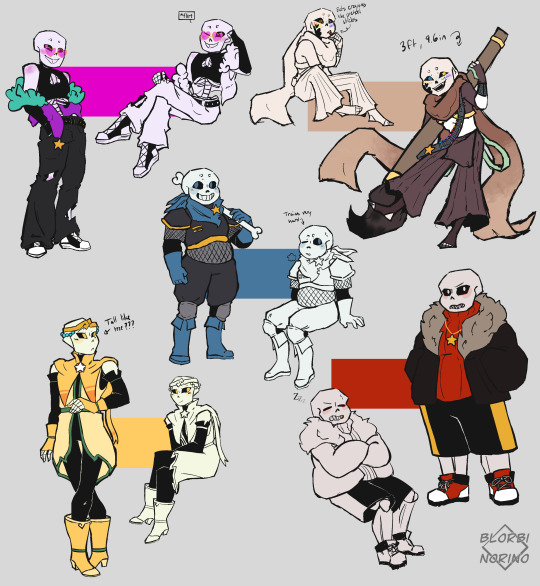
Star Sanses But There's More Of Them
Figured I would make a sort of master post for my Star Sanses interpretation! This is just an idea I'm playing around with, I don't plan on making a proper storyline for them at the moment. Just me exploring characters!
Long post ahead-
General:
All five members have star badges, per Blue's insistence ("So they look more like a team!" Ink liked the idea of them all sharing a design element, and Sugarplum thought the idea was fun, so Dream and Red were outvoted). The badges are equippable items to give each member a bit of a boost in combat (exact stats have yet to be decided).
Combat:
The five of them end up a pretty efficient team in fights, especially against Nightmare's Gang (plus Error sometimes). Even when Dream is occupied fully with Nightmare, and Ink's attention is on Error - Blue, Red, and Sugarplum manage to hold their own even as incodes. Combat roles (per the rules of DnD, for no real reason) are as follows:
Dream is the leader, he maintains party focus and morale, and generally decides the strategy going into a fight. His ability to sense the feelings of others allows him to monitor his teammates even during combat, so he can call for a retreat if necessary. (Switches to/also serves controller role, when needed.)
Ink is the group's striker, he's fast and he hits hard with precision, but it can be difficult for him to focus on more than one enemy at a time. Stays up close to the opponents, falls back behind the others on occasion to refill his paints or regain his bearings. (When fully necessary, he can use his brush to take broader strokes and serve as controller with color coded AoE attacks. Can serve as leader in extremely rare situations, but that's not nearly as fun, so he's content to let Dream do it.)
Blue is the defender, he's the tankiest of the group despite his shorter stature. He has the highest base defense of the group's three incodes, since he's essentially a Papyrus. Not much aggression in combat, preferring to help cover the others as they attack. (Can switch to striker role, if necessary.)
Red is the controller of the group, his bones and blasters let him cover a wide area from a safer distance. His stats still aren't great, so he hangs back from up close combat, and relies on Blue to help maintain the distance, especially when he gets tired and needs a bit of time to recover.
Sugarplum is also a controller, technically speaking. He focuses less on direct combat and more on effects, usually ACTing to lower an opponent's AT, DF, or speed. He also hangs back from direct fighting most of the time, and heals the others (mostly Blue) when their HP gets too low.
General Team Dynamics:
Dream: The leader of the group, as agreed by everyone else. He's friendly and easy to get along with, so he serves as a good "face" for the team. (Ink also thinks Dream having his own "gang" is a fun parallel to Nightmare!) Keeps the group on track when on missions, when the others' antics (affectionate) threaten to veer them off course. He's nervous about the responsibility this sort of role comes with, and whether or not his aura is skewing his teammates' evaluation of him as a leader, but he's determined to do his best.
Ink: Local menace. Bastard. Usually the cause/intigator of the team's distractions. Here to have a good time, occasionally at the expense of others. Sends cursed memes to the team groupchat at 3am. Luckily the others don't mind his sense of humor (Red thinks he's funny as hell sometimes), and Blue's general enthusiasm usually just serves as fuel to his fire. Will randomly give his teammates a thoughtful gift (a trinket he found somewhere that reminded him of them), and then steal food off their plate before they can say "thank you." Overall he's having a good time, and the others have just accepted this weird eldritch paint skeleton on their team.
Blue: Underswap Sans! As peppy as ever, always there to cheer on his friends and tell them he believes in them. Tends to get caught up in his own excitement sometimes, but means well! His ability to befriend even the more hostile residents of the multiverse makes him the glue of the team, keeping everyone together and on the same page even when Dream and Ink argue, or Red is a bit too abraisive. Since being exposed to the multiverse and joining the team, he's changed his focus from being a royal guard back home, to being a hero alongside his friends. There are people to be helped, and he's found the recognition he's always wanted but couldn't quite achieve back home. He's still technically a sentry back in Snowdin, and still has to return relatively frequently to keep the whole multiverse thing under wraps, but his brother helps cover for his absence. (Papyrus isn't super fond of the whole concept, especially not Ink, but he supports his brother 100%.)
Red: Underfell Sans! The designated grump of the group, he still hasn't really shaken off the defensive habits he learned from back home. The "tough guy" of the Stars, he's generally not a bad guy once you get past that wall he keeps up. Is steadily improving, unlearning a lifetime of defensiveness and distrust is difficult. (His jacket is heavy, and he would drop it over a teammate's shoulders in lieu of a weighted blanket if they needed it though. Just don't go spreading those kinds of rumors about him.) Has not told his brother about his multiverse-hopping escapades with the other Stars, partially out of worry that his universe will start bleeding out into more peaceful ones. He's dodging that particular conversation with everything he has.
Sugarplum: Underlust Sans! Doesn't really live in his own universe anymore, spends 99% of his time in the Omega Timeline. Doesn't like to talk about his universe, dodges any questions in relation to it (luckily in multiversal etiquette it's considered rude to ask questions about someone's universe, unless invited to do so). Didn't start out as much of a fighter, and still doesn't quite match up to the other Stars, but he can hold his own in a pinch. All the fighting and training and running around burns energy, which helps keep his soul from acting up. Wine aunt energy, always up to date on drama in the OT. Generally pretty chill, with an easygoing attitude that lets him help Blue smooth things over when conflicts arise in the team. Drinking buddies with Red, can relate to having a messed up universe he'd rather not discuss.
~~~~~~~~~
Dream -> @/jokublog Ink -> @/comyet Blue -> @/popcornpr1nce Red -> @/underfell Sugarplum -> @/nsfwshamecave
#utmv#ssbtmot#star sanses#dream sans#ink sans#underswap sans#underfell sans#underlust sans#rambling#masterpost#big big post
388 notes
·
View notes
Text
One thing I love about Miles Edgeworth is how realistic and practical he is, more than he is moralistic. As much as Miles cares about justice and doing what he thinks is right, he’s not fueled by belief the same way, for example, Phoenix is. And this is one of the things I feel like gets ignored or brushed aside when Miles's character is softened too much.
Both pre and post redemption, Miles puts a lot of emphasis on reality and the bottom line of what people can do in a situation.
In Turnabout Goodbyes, the first thing Edgeworth says in response to Phoenix asking him why he became a prosecutor instead of a defense attorney is: "… I couldn't let myself deny reality like you."
He also doesn't truly believe that every defendant he prosecutes is guilty, contrary to popular belief. In Turnabout Sisters, he says this: ""Innocent"…? How can we know that? The guilty will always lie, to avoid being found out. There's no way to tell who is guilty and who is innocent! All that I can hope to do is get every defendant declared "guilty"! So I make that my policy." Miles is disillusioned with finding the truth and trusting people that he settles for doing all he can hope to do.
And when you think about it, his motivation of finding the truth is an extension of his realism. After all, the truth is quite literally the most objective, realistic thing ever. In 1-3, after helping Phoenix convict Dee Vasquez, he says: "Will Powers was innocent. That he should be found so is only natural… not a miracle." The truth as a motivation is probably a grounding force for him.
When Miles comes back in Farewell My Turnabout, he calls out Phoenix's flawed motivations for becoming a defense attorney by offering realism: "We aren't some sort of heroes. We're only human, you and I. You want to "save someone"? That's something easier said than done, wouldn't you say? You are a defense lawyer. You can't run away from that. You can only fight. That's all you can do." Miles isn't saying Phoenix can't "save someone". Miles is saying that Phoenix shouldn't be so focused on saving someone that he forgets that his job as a defense attorney is only to fight for them.
Side note, I love the way Miles comforts people, he isn't exactly "nice" but he's incredibly kind. His blunt honesty digs at the heart of the matter, and he gives them an extra push because he respects them enough.
And then there's, possibly, my favorite Miles Edgeworth line: "It doesn't matter how many underhanded tricks a person uses… The truth will always find a way to make itself known. The only thing we can do is to fight with the knowledge we hold and everything we have. Erasing the paradoxes one by one… It's never easy… We claw and scratch for every inch. But we will always eventually reach that one single truth. This I promise you." This directly parallels the line he says in 1-2, and it makes me emotional every time I think about it.
The fact that Miles Edgeworth never lost his unwavering realism, in both quotes he acknowledges how untrustworthy people can be, but gained a new purpose.
#miles edgeworth I love you#very much#ace attorney#miles edgeworth#aa1#aa2#turnabout goodbyes#turnabout sisters#farewell my turnabout
661 notes
·
View notes
Text
I’ll admit a thing. Prior to Haikavetham I thought that Hoyoverse wasn’t interested in developing MLM ships too much. I was okay with that too because yuri gets less attention anyway and HYV was obsessively focused on it. But there was always that fear in me that their obsession with WLW ships was likely somewhat inspired by fetishisation.
But then Haikavetham came along and shattered that assumption for me. I thought no other MLM HYV ship could possibly come close to it but Phaidei is actually insane. You can see that this company, with their limitations even because of censorship, is trying pretty hard to make a good MLM ship that fans can decipher easily.
3.1 spoilers up ahead. And this post is absolutely an excuse to collate “evidence” for how gay Phaidei is
1. Phainon and Mydei being parallels to Kephale and Nikador (respectively), and also possibly being inheritors to their coreflame (Phainon left but it’s almost confirmed). Where Nikador allegedly fell in love with Kephale, who is their rival and fought them. A very direct parallel to Phaidei
2. But it’s less about their parallels and more about what they do at present in the story. The most conspicuous incident of this is the last part of 3.1’s quest, where they’re parting. Firstly, Phainon is the last person Mydei met. He was the last farewell Mydei wanted to give before he left. Secondly, when they do talk, Phainon asks this
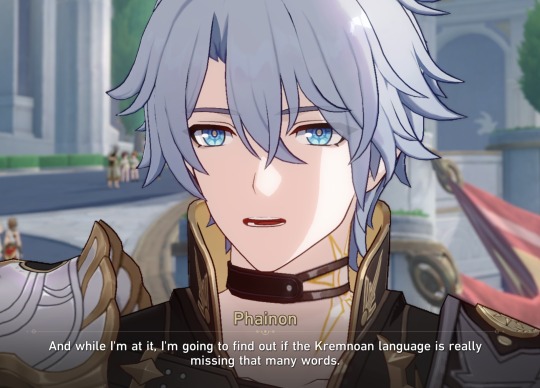
To which Mydei first replies that the Kremnoan philosophy can never be encapsulated in a dictionary. And then he says this

Don’t tell me this doesn’t read like Phainon worried that the word for romance really doesn’t exist in the Kremnoan language but hoping that it does. Because language makes culture. And as a Kremnoan, that should mean, at least in theory, that Mydei is not fully capable of romance. But this reads like Phainon knowing they have feelings for each other, and teasing Mydei about it. Like “hey I know you say romance doesn’t exist in the Kremnoan language but you definitely like me so you’re probably lying”. Because why would this be one of his parting sentences? It’s too irrelevant at the moment.
Add to this what Mydei says in the end. Don’t tell me this doesn’t read like the most classic doomed gay ship trope! Because it is!! It is!!!!
(Also I don’t know how many people noticed this but when Mydei says the last sentence, his tone is uncharacteristically soft)
3. This GIF.

I can’t stop thinking about it. Phainon knows Mydei has his back (and vice versa because… lol). Phainon feels absolute relief knowing Mydei is with him, and they will fight together. Phainon trusts him, and Mydei trusts Phainon even more.
There is also this scene.

Since my post is getting long I’ll recommend reading a small breakdown of it here (much better explained than I could). They have each other’s backs, and they trust each other with everything. Also the way Mydei says “found you”. I cried.
4. Including their lives!

What an insane scene man. Reveal your proverbial Achilles heel to one man and one man only, who coincidentally happens to be the man who you trust watching your back.
5. They help each other get better. Not much explanation needed but Phainon and Mydei understand each other deeply, and they understand the other’s desires and even masked feelings. Phainon helped Mydei make that final decision that he needed to change the lives of Kremnoans and be a better king (by recommending he go to Chartonus, to whom Phainon had relayed details about Gorgo’s signet ring)

And Mydei helps Phainon with this


There is, of course, a lot more “evidence”. The smallest of expressions (like damn Mydei smiles a lot around Phainon lol) to it being heavily implied their comfort zone is each other. My point, though, is that I’m very impressed by a Chinese company willingly making so much implied gay content despite censorship restricting them. Phaidei has become another one of those iconic HYV ships for me at least.
Btw, if you see this post, please don’t add “but they could be friends-“ I’m aware and it’s a redundant argument. There is a very thin line separating platonic and romantic love. Yes this could be an example of a beautifully higher level of platonic love. But I choose to read this as romantic because I trust in a game company known for making heavily implied gay couples to have made another one.
And please do not treat this as discourse despite how I started it!! This is about Phaidei and I wanted to give a background about why I think they’re pretty gay
191 notes
·
View notes
Text
FAQs
What is TES Gala?
An idea started from a treasure found in ESO, I developed a headcanon that the Altmer have something similar to the Met Gala. Loving the idea, I decided I wanted to try at making a small community event for tesblr focusing on fashion (and partying lol).
For one week, a gala will be held. A party invitation post will set the overall theme. Once you post your submission(s) to the event, it will be reblogged here to be shared.
When is TES Gala?
June 15th to June 21st
Theme will be announce by the end of March, if not a tad sooner.
Where is the Gala set?
Anywhere! This isn’t set to the Altmer in Summerset. This can be a small village, a royal event in Cyrodiil, or a party taken to Oblivion. This can be the scene to a Thieves Guild or Dark brotherhood quest. This can be a Modern AU or anywhere on the in-universe timeline!
What mediums are accepted?
Just about anything!
Just a few ideas, but not limited to:
Fan art (sketches, doodles, clothes designs, full blown renders, etc)
Fanfiction (can be either posted in full on Tumblr or a link to AO3)
Gifsets
Moodboards (Can't draw, but wanna show us what your OC would wear? Go for it!)
Animatics
Meta analysis (headcanons on fashion, using historical parallels, etc)
Embroidery/Beadwork
We’d love to see whatever you made ― digital, traditional, crafts, anything!
Is there a submission limit?
No! If you have multiple ideas for the gala week, I encourage you to share all that you make!
What are the rules?
The rules can be read here [link]
How do I submit my work?
Post your work on tumblr and tag it with #tesgala25. I will be tracking the tag all week long. You can also directly tag with @tes-gala
I will then share your work with tags for characters, mediums, and if needed, try my best with adding image ID/alt text.
Alt text and image IDs
To increase the accessibility for our works, I do encourage all artists/graphic makers to use alt text/image IDs. This helps those with screen readers and is more inclusive.
A few links to help how to do this:
Write Helpful Alt Text by Harvard Digital Accessibility
How to Create Image Descriptions
How to Write Alt Text and Image Descriptions
Decision Tree for Writing Alt Text
OC Submissions & Use
To follow the party aesthetic, you may submit a TES Original Character through asks with information about them if you wish for your OC to cameo in another's work. The one submitting must understand they are giving reasonable permission for another to use their OC.
Those interested in using another's Original Character must use the OC respectfully and within reason. You must tag the owner with your submission. List of submissions found here: [LINK]
More information [LINK]
Who is running TES Gala?
Currently just one person. Should this become bigger than expected, I may ask for help.
@sulphuricgrin
If you have any more questions, feel free to send an ask!
updated: 03/20/2025
152 notes
·
View notes
Text
ANOTHER MULTIVERSE FIC because I can't stop myself, apparently. An injustice!Superman one, this time. I imagine you were a small-time hero/vigilante in this one, so Superman knew (and liked) you before he turned bad, but you weren't super close, before.

-You wake up in an unfamiliar room, tied to a chair, not knowing how you got there. Kal doesn't ever let you leave the fortress. But you don't know how anyone else could have gotten in to take you here, wherever here is. Maybe it was Kal? But why would he do that?
-You spot a woman tied up in another chair next to you, it seems like she also just woke up. She reminds you of someone, but you can't remember who exactly... You want to ask her if she knows more about what's going on, when you realize you're both gagged. Shit. You can't even communicate with her!
-A man comes in, rambling something about how he's glad you're finally awake and about his plan finally taking shape. You feel like you should know this guy, but can't quite put a finger on it...
-Being unsure if you know who he is, as you're "not from here", he introduces himself. He's Lex Luthor.
-Wait. Lex Luthor? The Lex Luthor? The dead one, who was killed by Superman? Is this a prank? Because if so, it isn't funny at all. And quite dangerous for everyone involved.
-Luthor (if that is his real name) then focuses on the woman next to you. He addresses her as "Mrs. Lane".
-Lane as in Lois Lane? Like, Lois Lane from the Daily Planet? Clark Kent's, Superman's wife? Now you know something is extremely wrong. She's dead, too, and everyone knows not to mention her name unless they want to face Superman's wrath... You make a few muffled sounds beneath your gag, itching to ask about just what is going on here.
-Luthor says he's going to explain everything, don't be so impatient! He has a machine that can open portals to parallel universes, which is how he got you here. His plan includes kidnapping the person that is most important to Superman in his own universe (Lois Lane), the person most important to Superman in a second universe (You!) and then making the Supermen fight each other by threatening your lives. The only way to save you is if one Superman dies. This room is Superman proof, he can't hear or see anything that's happening in here, so they can't just swoop in and save you. After the fight, he's going to let the winning Superman enter this room, promising him that he can rescue Lois or you. Except not really, because he's going to try to kill the winner too, because that should be easier after he just fought another Superman, right? He hasn't opened a portal to let the Superman from your universe know about how he can save you, yet. He closed the portal he got you through immediately after kidnapping you, so he had more time to prepare everything. How he found you? Something about being able to detect kryptonian dna residue on you. And you were in Superman's fortress. Easy to combine that you must be important to him.
-That's... actually not a terrible plan! Sure, it might not work out exactly the way that Luthor is planning, but beating Superman with Superman is a great idea! Actually it'd be great if Luthor got a third one here. Two Supermen should definitely be able to defeat one Superman, right? Unfortunately you can't communicate any of this through your gag. Damn, you'd love to help him improve his plan...
-You wonder if he chose your universe completely randomly, or if he chose an evil Superman on purpose. You don't think he did, he didn't mention the regime with one word, and if it existed in this universe he wouldn't be working on this stupid plan. And Lois wouldn't be alive, probably.
-Before you can let your thoughts spiral even more, Luthor falls over. Huh? Is he unconscious? You spot Batman coming towards you. Ah. That explains that, then. Man, you haven't seen Batman in such a long time...
-"Are you two alright?" He quickly cuts through the ropes tying you to the chairs, freeing you. "Good thing you used your bat emergency-signal, Lois. I was able to get to you before Superman could fall for Luthor's trap." Wait, why would Lois contact Batman? Oh, right, sometimes you forget that he and Superman used to be friends, so obviously his wife would trust him too.
-He takes off both of your gags and then turns to you. "We figured out you're from a parallel universe, but don't worry, Nightwing is currently working on a way to get in contact with the Superman from your dimension, so-"
-"NO!", you scream, making Batman look at you in confusion. You quickly tell him to contact Nightwing, to make him stop trying to open a portal or god forbid, contact Kal!! Noticing the urgency in your voice, Batman quickly complies and lets Nightwing know to stop what he's doing, before asking you to elaborate. Phew! The last thing you need is an angry Superman wreaking havoc in a second universe.
-You start explaining to Batman about how your Superman started changing for the worse after Lois died (sparing the details, as she's kind of sitting right next to you), started to get darker, kill villains, everyone who did something bad, people who disagreed with him. Other heroes, even. People he used to be friends with. How everyone who didn't agree with him and join his regime, including you and Batman, had to go into hiding, trying to find a way to stop him. Clark, no KAL-EL found you at some point, but instead of killing you, he unexpectedly took you, basically imprisoned you. Kept you like a pet who's not smart enough to make their own decisions. (You never even knew he liked you like that at all, before that. Sure, he was always nice to you, but he had Lois!)
-Lois seems visibly shocked, whereas Batman just listens to you stoically. "All this to say, it's good to see you alive, Lois!" You smile weakly. She tries to smile back, but before she can respond, Batman cuts her off. "We should leave this place. I doubt it's very safe here. We should return to the Batcave, think of a plan." You spare one last glance at Luthor, who's still lying on the floor (Are we just going to leave him here? Huh. Ok.), then follow Batman outside.
-As soon as you're out of the building, something rushes past you. "Lois! Are you ok? Did he hurt you?" Not something. Someone. You try not to flinch as he fusses over her, while she reassures him that she's fine multiple times.
-After he's convinced she's not hurt, he turns to you with a gentle smile. "Hello! So you're close to the Superman in another dimension, then?" As he takes a step towards you, you instinctively take a step back towards Batman. Clark frowns at him quizzically. It's funny, he almost looks like a confused puppy. You would smile if you didn't know that this is all a facade to distract from his god-like, destructive powers.
-"Turns out the other version of you is some kind of evil dictator." Well, leave it to Batman to get straight to the point. Clark opens and closes his mouth a few times, thinking about what to say. "Well, I can assure you that I'm not like the Superman you know. I promise you, I'm a good person! At least I try my best to be one. You don't have to be scared." His voice is getting increasingly gentle, trying to reassure you.
-"Oh yeah? That's exactly what the Superman from my dimension would have said, before..." You don't mention his wife's death, not wanting to anger him. "The same thing could happen to you. You might be nice now, but who knows what the future holds?" As you're saying this, you slowly move slightly behind Batman. Just in case. He should have some kryptonite on him, right?
-Superman just frowns harder, then turns to Lois. "We should go home." He picks her up and turns to Batman. "Contact me as soon as you have plans for... handling the other me." With that, he takes off.
-Batman ushers you into the Batmobile, where Nightwing (another ghost, to you) is already waiting. You keep turning to look at him during the drive to the Batcave, while Bruce explains the situation to him. If they notice your weird looks, they don't mention it.
-You allow yourself to feel some hope. Maybe you can contact your Bruce? Help him out! Send a few still good Supermen! Your head is spinning with ideas, and you're sure Batman can come up with even better ones. You can't help but smile, your nightmare might finally be over...

#once again i didn't exactly write the relationship this is about but wrote around it. hrm.#whatever i really enjoyed writing this and I hope you guys enjoy reading!!#hope i didn't make any weird spelling/grammar mistakes. I tried to proofread but. I'm tired.#yandere superman#yandere clark kent#yandere dc#yandere!superman#dark superman x reader#injustice superman x reader#x reader#yandere#reader insert#dark superman#yandere superman x reader#superman x reader#lycheewritings
444 notes
·
View notes
Note
Anna!! Something I noticed and wanted to get you input, the scenes where Buck and Eddie were placing the flowers on the tables. Is there’s something to be said about Buck placing his yellow flowers on a tan/warm beige table mat versus Eddie placing is white flowers on a blue table(coffee table) mat?
the minute I noticed it after seeing a screenshot of the images next to eachother I thought hmm are those the colors Anna on tumblr is always mentioning buck and Eddie need to get to, ‘their’ colors 😅bucks blue and Eddie’s warm yellow: tan
Hi darling! Okay, I gotta be real with you, I don't know anything about flowers, I'm allergic to most of them, so I try to stay away, that being said, the colors did pique my interest, especially the ones Eddie puts down in the first scene. Because it's the arrangement with the most colors. I can't identify the flowers in this one tho, so I can't say anything besides I think it's interesting that it has so many colors, even if the yellow flowers are the thing that catches your eye first and he places it in the blue tray.

But the one Buck puts down and the one from the last scene are fun for a lot of reason I found out while googling compulsively about the meaning of flowers.

Talking about colors, the colors here are a lot more cohesive than Eddie's, even as far as matching the mat, but what caught my eye in this is the sunflower of it all, because most places you look for tell you sunflowers are about loyalty and admiration. And a lot of places I read talk about it as a flower to bring joy. Since it follows the sun, they also use it as a flower of hope. Which is kinda insane in the greater context of Eddie's plot and the role Buck has in his life, yk?

But the flowers in the last scene are the ones that drive me a bit insane.
White Roses: Purity and New Beginnings White roses are the lightest and brightest variation of these incredible blooms, which symbolize the genuine purity of love in all its forms. They are commonly used in grand gestures, such as proposals, weddings, and anniversaries, because of their unmistakable declaration of eternal love. White roses represent everlasting love, innocence, youthfulness, loyalty, purity, and new beginnings. Their romantic history shares an equally prominent somber parallel. White roses are often used to express remembrance in times of grief. Their bright color represents a ray of hope, acknowledging the blessings that lie just beyond the darkest times.
First of all, most wedding planning places will tell you to use a white rose bouquet at your wedding, and that arrangement lowkey looks like one (I got an ask about this, mentioning the wedding bouquet specifically but I can't find it again, but anon this one is also for you), but it is also a flower that can be used for funerals because they can also be a symbol of hope for the future in trying times, like, what? No matter how you look at those, they are a symbol of eternal love. They had Eddie put down the flowers of grand gestures as Buck pulled the ultimate grand gesture, and my brain lowkey stopped working.
They wanted us to pay attention to the flowers, it's part of the dialogue, and we get shots focused on them, so I'm kinda losing it a little bit, ngl. Why a symbol of eternal love that looks like a wedding bouquet???????????
113 notes
·
View notes
Text
a deep dive on adam/blue
okay i just need to do talk about blue and adam’s brief “relationship” because (1) i never used to like it and it always felt needless in the story/got in the way of the found family, but upon rereading it works well in the narrative and (2) there is way too much underlying misogyny when discussing blue that i just need to talk about
the gist is that blue and adam are such similar people who were both using their relationship as deflection, and were not good to eachother because they’re 16/17! not because they are evil or irredeemable
but the reason i realized upon rereading why the adam/blue relationship is so important in the first two books is because it shows us exactly why both pynch and bluesey work so well:
adam wanted blue to be the simple thing in his life that isn’t tarnished by his abuse, which is a completely valid reaction from the trauma he is facing. he’s secretive about his home life (not that he owes that to her) because he wants her to see a different version of himself. that’s why he is more upset about the kissing than the lack of emotional romantic connection.
adam calling blue in front of ronan, pointing out to gansey that he “got blue” without him shows it’s also just a teenage boy competition thing. he doesn’t really understand what entails in a healthy relationship and just wants blue, to have anything of his own. this makes sense for a traumatized 17 year old, but isn’t fair for blue to have to be the simple “easy” thing in his complicated life when she has her own issues and life, and adam is in a really bad mental state and expecting things from her she doesn’t want to give
while adam wants to seperate from his abuse, blue wants to seperate from her curse. she does want adam, and she firmly tells the universe that she wants to choose him, not gansey as an effort to escape their fate.
but of course, she is inevitably drawn to gansey and blue tells gansey about the curse and not adam, because she doesn’t want to break their allusion that they could just be normal teenagers, and gansey quite literally needs to know or he will die.
it is unfair to adam that she immediately went to gansey after and used him as deflection from her curse when she knew something could happen with his best friend, and to hide it from him after.
this conflict is showcased really well in their fights in the dream thieves. adam is solely focused on why blue won’t kiss him, blue is focused on why he wont tell her anything, and just keeps bringing it back to gansey (again, emotional connection vs the kiss, the curse and adam’s abuse lingering)


adam is extremely unfair to blue during this because he acts as if blues romantic attention is something he deserves, even pushing it after she tells him about her curse because he is so desperate for connection and blue doesn’t just want to be his girlfriend:


blue is extremely unfair because after the fight, she immediately went to gansey, his best friend right after they broke up, and didn’t consider adam’s feelings or how effected he was by his trauma and how rocky his friendship with gansey was - especially talking about adam with gansey
so, yes they both messed up and used eachother!
but at their core, it shows how well adam and ronan work: someone adam can kiss and love who has seen and fought his abuse head on and still loves him for it and understands him. he never got a chance to try and hide from ronan, he knew adam was from the beginning
and why blue and gansey are soulmates: someone who has an emotional connection with blue and sees her as a person and a friend first, who wants to kiss her, badly, but doesn’t expect anything. (there’s a good parallel in tdt of gansey discussing blue here vs the adam fight)

but onto the underlying misogyny: somehow the blame is always put onto blue for “cheating” and acting as if she was a master manipulator?? there seems to be a weird undertone by placing the blame on the only female character, while the boys are allowed time to grow and make mistakes and just be mean! especially since blue didn’t know half the things going on with adam, and wasn’t trying to hurt him, but it is always off-putting to me when people are always so defensive of everyone except blue…
i think they’re both equally at fault! it’s messy and mean, but the fact that they both heal and both recognize and regret the hurt they’ve done to each other shows there’s no need to completely absolve one party. like they both admit they were shitty, we should be able to do the same and love them all the more because it’s real! they’re young! they get it right eventually! i love them both so much
#the raven cycle#richard gansey#blue sargent#adam parrish#ronan lynch#bluesey#pynch#trc#adam parrish and blue sargent
116 notes
·
View notes
Note
how do we know in the books that john is indigenous? can you say more about how his indigeneity is important to his story?
hello! so there is a word of god post on race (doesn't mention John but mentions that Gideon is "mixed Maori"), BUT I frankly don't think word of god statements are worth any weight without actual in-text support (see: the "dumbledore is gay" situation). SO!
Specific evidence that John Gaius is Maori, as revealed in Nona the Ninth:
When he is listing his education, John mentions having gone to Dilworth School (John 20:8). Dilworth is an all boys boarding school in Auckland and accepts students based on financial need instead of academic or sporting achievements. Demographics appear to be about 70% low income Maori boys, indicating that it is highly likely that John is Maori
John reports that P- said he looked like a "Maori-TV pink panther" (John 15:23) when his eyes turned gold. Maori TV is a TV station that is focused primarily on Maori culture & language revitalization, with presumably all or mostly Maori hosts, and tbh I don't see why P- would say this unless John was himself Maori
John uses a te reo Māori phrase ("kia kaha, kia māia") (John 5:20) when he is saying goodbye to the corpses in the cryo lab before the power is shut off. Though it is possible he said this as a non-Maori kiwi, but in combination with the previous two points of evidence I think this all very strongly points to him being Maori
He also renames his daughter Kiriona Gaia, "Kiriona" being just literally the name "Gideon" in te reo Māori
TLT is not a series that hands you anything on a silver platter but to ME this is all pretty solid proof
Why is this relevant to The Locked Tomb?
In Nona the Ninth, we learn that before he completed apotheosis and ate the solar system, John was basically trying to save the earth from capitalism-caused climate change. Climate justice and the rights of indigenous people over their own land are deeply tied together, in the same way that climate catastrophe and capitalism/ imperialism/ colonialism are linked. disclaimer that this is NOT my area of study and others have definitely said it better; this is just the basic gist as I understand it, but on quick search I found some sources here and here if you want to do some reading.
TLT is not a series that hands you anything on a silver platter, but i don't think it is a stretch to see John as an indigenous man trying to save the earth and getting ignored and shut down at every turn by primarily western colonial powers (PanEuro, the USA) who declare him a terrorist and then as a reader thematically connecting that to the experience of indigenous climate activists IRL
there are absolutely TLT meta posts that have discussed this before me; tumblr search is nonfunctional and I have been looking for an hour and a half and cannot find anything specific even though i KNOW i reblogged multiple posts about this in the first few weeks following NTN's release. sad & I am sorry
I think that by the time the books take place, John is 10k years removed from the cultural context he grew up in, with the Nine Houses having become a genocidal colonial power in their own right (with more parallels to be made between John's forever war for the resources of literal life energy and like, oil wars), but I also think that John Gaius is a fictional character who can represent and symbolize multiple different things in service of telling a story. (not to mention the potential thematic parallels being made to how oppressed people sometimes are pressed into replicating the power dynamics of their oppressors and continuing the cycle--now that is a tumblr post i KNOW i read last year and definitely cannot find right now, once again sad & I am sorry)
How Radical Was John Gaius, Really is a forum thread that was locked by the moderators after 234534645674564 pages of heated debate
#john gaius#nona the ninth#the locked tomb#tlt meta#i need to fix my tagging system fr#john meta#tlt thoughts#trb.txt#if anyone wants to add anything or correct anything PLS do so!!! i did my best hope this helps anon. this took me 2 hours
863 notes
·
View notes
Text
I know Color has given Killer thousands of rubix cubes, puzzles, and picky pads.
It’s to keep him stimulated and fulfilling ST2’s needs for “something new.” ST2 wasn’t made to be idle, he needs to keep his mind and hands working—absorbing information like a sponge, even if his apathy and dissociation probably means a much harder time paying attention and retaining that information—and Color understands that so he tries to help him find safe ways to do that in a way that doesn’t involve the poor man coming home to his friend covered in blood and possibly missing limbs.
The two of them probably engage in parallel play a lot; while Killer’s picking the small toy duckies and various colorful alphabet beads out of various ridiculously shaped resin molds, Color’s sorting and organizing them into jars by shape and color.
And later the two of them will go out to buy more resin and molds to make more picky pads and redo the activity in various forms. The different beads and mold shapes is new enough each time for Killer, and the repeated routine activity and organizing works wonders for Color’s autistic ass. Sometimes they’ll switch the roles around when Killer gets bored and definitely after he tries to eat a few of the beads.
I think Killer would enjoy the act of creation. It fulfills the need for something new of course, but it appeases his more moral personality in the form of ST1 to know his hands are able to do more than destroy and murder.
Those hands know a thousand ways to coerce confessions—both false and true—out of many monsters, but now they’re also learning to wield wood into the shape of a red panda and how to create string necklaces.
While Color’s watching his favorite comfort shows for the thousandths time, Killer’s intensely focused on a solving a word puzzle while listening to Color infodump about his favorite character in the show.
Sometimes they try to sit in silence but that quickly gets boring to Killer and he runs the risk of literally trying to disassemble his body parts, and Color gets overstimulated by too much noise, so they compromise by letting Color set the pace of the yapping.
Killer is the professional yapper in this household, but he finds listening to Color’s voice soothing and he enjoys learning more about his person. He has never found another to be as fascinating.
#killer sans#sans au#sans aus#bad sanses#killertale#utmv#color!sans#color sans#othertale#othertale sans#other!sans#colour sans#colour!sans#undertale something new#killer!sans#colorkiller#killercolor#epic sanses#good ending#utmv headcanons#undertale headcanons#underverse#autistic headcanon#bad sans#bad sans gang#nightmares gang#nightmare!sans#nightmare sans#dreamtale#color spectrum duo
241 notes
·
View notes
Text
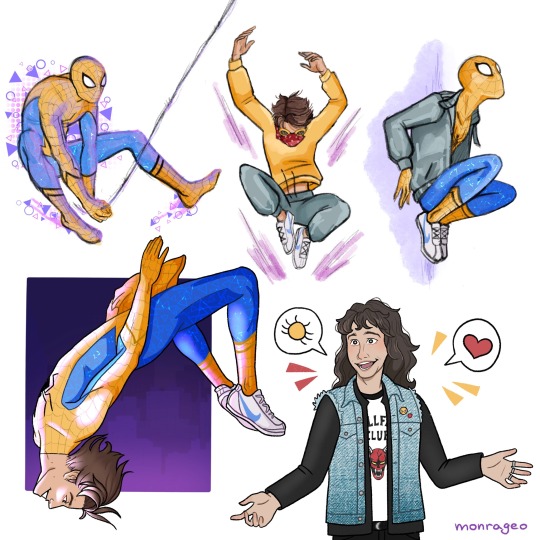

Saw a lot of Spider-Steve art so I had to jump in. Most art modernised him but I want my 80s, mallrat, neon lights Spider-Man + I wrote his origin story. *POSES FOUND ON PINTEREST*
Also Steve looks great in the classic red and blue but I wanted him to have his own costume so yellow he shall be. Now onto my headcanons.
In a world where Hawkins is a megapolis a teen boy gets bitten by a radioactive spider in 83’ while visiting Hawkins Lab (Think less abandoned more Oscorp/Alchemax) and so it begins. He starts doing small good things around the city, experimenting with his powers.
But he isn’t thinking about being a superhero or anything close to that (I imagine the drawing with the sweats and goggles is his first “costume”). Then he gets with this amazing girl-Nancy Wheeler.
Life is looking up for Steve he’s got these weird powers that get him to be the basketball and swim team captain. He’s popular, he’s got this amazing girl that inspires him to be better and better.
He looses his popular crowd friends, he wants to be better. He starts thinking about the superhero thing and actually goes through with it. He isn’t shouting it from the rooftops but news is getting around that a guy in spandex is busting criminals- Spider-man/King Spider.
Steve gets cocky, thinks he’s on top of the world, untouchable. Then Will Byers goes missing-that’s a whole separate story. Nancy and John start their investigation. Steve gets jealous etc.
In the end a battle breaks out and Steve is unable to save one person-Barbara Holland. His girlfriend’s best friend. That of course destroys Nancy. She doesn’t know Steve is Spider-man, she seeks comfort in him but things are not the same.
There’s this whole thing with Jonathan, the obvious attraction, the compatibility. But also Steve’s guilt, his self hatred. He realises he was too blindsided by his cockiness. Barb’s death is on his hands. He breaks up with Nancy and solely focuses on being the best Spider-man he can be.
That of course costs him friends etc. but when you’ve been through what he has high school drama just seems pointless… and so King Steve falls from the throne.
I imagine the Nancy story line parallels the Gwen Stacy one in the original comics (without the death and clones), maybe Nancy even blames and hates Spider-man the way Gwen did… that also contributes to the Stancy break-up.
Perhaps Nancy becomes hyper focused on catching this Spider-man so he can be held accountable for Barb’s death.
Anyways now Steddie, I think Eddie would love Spider-man / King Spider he’s some guy with spider powers and bright spandex that helps people, super camp, Eddie would love him.
I think Steve starts noticing Eddie in a new light when his lunch table tirades now also include how awesome spider-man is. This unapologetic support makes the now loser Steve feel like it is all worth it-the stress, the pain, the loneliness-
Tough he of course knows Eddie isn’t talking about him, he’s talking about Spider-man, the hero. Not the former popular guy Steve Harrington.
I have many ideas regarding a Stranger things!Spider-verse and which characters could be what. Maybe Barb’s death was something Lizard-like, but upside down version. Like something from the lap infected her? I like the idea of Steve’s father being involved in the labs, perhaps as a Norman Osborn parallel, without becoming the Goblin though.
The goblin/Norman/Harry Osborn storyline could be reimagined with Tommy perhaps??? Then Venom with Eddie (so perfect) or Billy (a tragic end)??
#steddie#steve harrington#eddie munson#stranger things#spiderman#spidersona#digital art#monrageo art
1K notes
·
View notes
Text
thinking about the wp!borm scene again. i'm not sure if this was with anyone else but i was genuinely jump scared when it happened??? like it was so sudden and unexpected i was like "WHY TF IS HE HERE" (same w my buddy who i was watching it with. hi soup), but i feel like it also is a super chance of pace from the rest of the series so far
as mentioned in one of my other posts before, when mysty's body was found, the camera changes from long, still shots to a handheld feel, focusing in and out, and ringing and muffled sounds which give the feeling of ivory actively dissociating + how intense the situation is
borm's scene, though has alot of these elements but is much, much more intense. instead of ringing it's a much more high-pitched sound that sounds really, really wrong, especially it sounds almost electronic compared to the acoustic, almost calm, instrumentals we're used too. like compared to the beautiful pianos and violins, borm's scene almost sounds like nails on chalkboard. it also sounds much more high-pitched than mysty's death which make it feel much more intense and instead of ivory dissociating, it feels like ivory's senses are heightened and she's running on adrenaline.
on top of audio, ivory is very close to the camera and the fact the camera is looking behind her so closely and shaking makes it feel like the cameraperson is also feeling the intensity of the situation, which helps convey that to the viewer as well (also, borm is, quite literally, running ivory into a wall which is. very uneasy as well). the camera coming in and out of focus, there's a very subtle black vignette that flickers in and out, which almost makes it feel like ivory is so stressed that she's nearly blacking out. we then instantly return to normal, which empathize just how stressful and foreign this entire exchange is
there's so many layers from a meta perspective that just show how stressed ivory is in this scene instead of telling the viewer directly--and instead making the viewer feel as stressed ivory in this scene and it's. So Cool
(and since i wanna mention this and this post is already getting too long, i'll put it under the cut as well. cw for mentions of vomit)
since ivory was so stressed based on the visual language, i think that's why she threw up in the shower scene as well. when someone is under a lot of stress, your body puts all of your energy into your flight or fight response instead of other body functions like digestion (which is why under a lot of stress, you can feel "butterflies in your stomach" because that's literally your stomach not working for a little bit. i've seen people theorizing that this might be ivory being implied to have an eating disorder that has purging, but i'm more inclined to believe she's just mega stressed + not really eating anything that day too). it's tiny, but it really shows how stressed ivory is because of all of this, as well as a parallel to pyro since he's the only other character to be shown throwing up, and they had that whole "staring at each other at a distance" shot in the first ep ....
#mcyt#no id#ivorycello#whitepine#whitepine spoilers#anyways. Yeah. thinking about this scene A Lot ...
66 notes
·
View notes
Text
People whose language is Sign have had to fight for acceptance from within the confines of a language that their opponents do not understand; they could not explain what they wanted until they got it. This has created an intense anger that subtends Deaf politics. The Deaf psychologist Neil Glickman has spoken of four stages of Deaf identity. People start out pretending to be hearing, with the discomfort of the only Jew in the country club or the only black family in the suburb. They progress to marginality, feeling they are not a part of either deaf or hearing life. Then they immerse themselves in Deaf culture, fall in love with it, and disparage hearing culture. Finally, they achieve a balanced view that there are strengths in both the deaf and the hearing experience.
Far From the Tree, Andrew Solomon. (2012)
The parallels here to other forms of identity adopted separately from parents, as this book focuses on generally, are incredibly vivid.
I have often idly thought that the intense sex repulsion you sometimes see in people who have newly found asexual communities after years or decades without the concept is part of a similar trajectory, for example. I also often see queer people more generally following this trajectory, and autistic people as well. This is a process for a lot of folks who find community only after a period of isolation among only people who don't share their own experiences.
It's something that should be, I think, gently handled with care and compassion by the communities receiving the person on a new journey to balance: let the person express their feelings and pain, like draining an abscess that has been full of pus for a long time, but make sure that the abscess is opened to the air and stays open so no new infections can fester while it heals. That is: gently keep the mind open if it tries to close around this new dichotomy of value, but don't be too startled or panicked about ugliness welling forth when the abscess is first breached. It will, with supportive care, drain and heal from the heart outwards as the angry irritation fades.
227 notes
·
View notes
Text
Red Dead History: My problems with it
Red Dead History is a book that does a great job at casting light over the history and background to the scenes, places and troubles we meet in Red Dead Redemption 2. Talking about both the things done well and the things done not so well, what is true to the time and place and what is not.
It is clear that the author knows alot about history and studied it, however there are times where I find it clear he spent more time focused on the real history rather than the in game and thus forgetting facts and drawing wrong conclusions.
When talking about the real life criminals that Dutch and Arthur are based on (Butch Cassidy, Sundance Kid and their gang The Wild Bunch) this very lovely and wrong sentence comes up: "Like Dutch and company, the Wild Bunch undertook robberies primarily for personal gain, not as a moral crusade against capitalism. Butch and Harry, like the van der Linde crew, certianly had a disdain for the corporate titans of their day, but it was desire for their wealth far more than social justice that motivated their heists." (The Wild Bunch, page 86) I do not think the author understood Dutch Van Der Linde very well, I don't think he understood the gang very well.
Dutch is a man based on princips, who can be found on any time of the day reading a philosopher who challenges capitalism and questions what man has become. "Men are fixated on greed, on desire, and on the acquisition not of experiences or pleasures but the ability to acquire." This is Dutch's hero, and he has several interactions with different characters like Mary-Beth, Molly, John, Abigail, Lenny and Arthur reading up quotes and discussing them, praising Miller to the heavens!
If that is not enough, lets look at the very first bank robbery that they commited, they did not keep the money, they gave it to the poor! And they still have their morals, like not robbing the poor, only the rich. We also have the fact that Javier joined the gang because of these morals, because he agreed with them.
While in the end, yes it might have been more for themselves, to get them to Tahiti because they got too big a price on their head, the majority of their time has not been.
Another example, just a bit further down the page that is wrong: "Another parallel to Arthur and Dutch, Butch Cassidy had a pronounced distaste for the racist ideologies so dominant around the turn of the century." While I can agree with him on Arthur, I can't agree with him on Dutch, Dutch is fairly racist, slowing his speech with people of other origins, calling Bronte a slur and "Here we are in this strange land of Papists and rapists." Papists meaning catholics, and the fact that a lot of minorities were hated on due to being catholics. (Read more detailed here)
Now this sentence is followed by: "One Black gambling companion of the gang noted that if anyone treated him unfairly, Butch would "get after them" with furious vengeance." Now that is not at all like Arthur or Dutch who are both in on the "stand up for youself" idea which is why they condone Micah because they expect Javier, Lenny and Charles to stand up for themselves. They ain't going to do anything. Also when they return with Sadie and Micah complains about having to sleep around people of color, Butch would have acted, Dutch and Arthut did not.
Several many pages later while talking about blood feuds we have this line "Like the mysteriously stolen gold from Red Dead Redemption 2" (The Blood Feud, 235) where I would like to point out that it is neither mysterious nor stolen(at least not by who you think). While it is not told in the story, we as players have the ability to learn about what happened to the gold.
On an island not far outside Saint Denis, hidden under a tree in a chest we can find a letter. This letter comes from Lucille Braithewaite and was written in 1803 to a Douglas Gray, whoms story was esencially that of Penelope and Beau, except Lucille was exiled by her family and took her family money, hiding it for Douglas to find and give to an organisation that would abolish slavery.
While it is not common knowledge about the letter, the other two things are, and if you are writing and publishing a book I would expect you to know your things.
A minor problem I have with his writing is that he puts the player experience into unenssesary boxes. For example he talks about the KKK and how Arthur encountered them: "One evening soon after their arrival, Arthur is riding on the outskirts of the dusty plantation town of Rhodes when he notices a constelllation of bright lights in the nearby woods." (The white-hooded menace, 115) He continues to talk about how Arthur curiously dismounts and sees who it is and that the player then has the choice to kill the KKK or watch them die.
While I do understand setting a scene, I think it is such an unessesary thing to add with the timing and place and what Arthur does when reacting to them. Rdr2 is known for being so unique and it feels so wrong to remove that, also because this encounter can happen at any time pretty much anywhere. I have never met them in Rhodes but I have met them in Big Valley twice, one time in chap 6 and one time with John.
Similarly he talks about the racist guy in Saint Denis and how it leads to the "inevitable conclusion of violence, with Arthur beating ot shooting the pamphleteer" (The Paradox of race, 96) as if it isn't completely possible to just walk away. And it isn't like the author never talks about the many choices the player can make, for example he talks about how Rockstar was under critisism because some boys had a kick out of tying up and killing women NPCs in different ways.
Red dead is such a wide experience and I don't understand why he is trying to narrow it down and tie it up into a box when he could have gotten his point across without needing to.
Last point I want to talk about is his idea for red dead three, that being Arthur Morgan in 1871 (Epilogue, 242), where I feel that it is more because he liked the time period more than anything. Arthur would be eight at this point and living with his dad (the one pic we have of him is taken in 1874). From what the author presents of the time period it does sound interesting with a lot of possibilites but I do not think it should be with Arthur if so, maybe with Black Belle or someone.
While I do really like all the history facts that the author brings, I am surprised at his lack of understanding for the gang considering his 3 playthroughs and 300 hours in game.
I have also heard rumors of historical inacuracies, and I am trying to dig deeper into that to see if there is something, but if anyone uses his work for something I would fact check him just to be safe.
#rdr2#rdr2 community#red dead redemption 2#arthur morgan#rdr2 arthur#red dead redemption community#red dead redemption two#john marston#red dead fandom#rdr john#dutch rdr2#dutch van der linde#micah bell#rdr2 micah#rdr2 javier#javier escuella#nthspecialll
88 notes
·
View notes